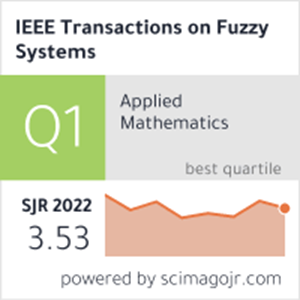Fuzzy Comprehensive Evaluation for Operating Load and Efficiency of Semiautogenous Grinding Process
IF 11.9
1区 计算机科学
Q1 COMPUTER SCIENCE, ARTIFICIAL INTELLIGENCE
引用次数: 0
Abstract
Semiautogenous grinding (SAG) processes are widely used in mineral processing. In industrial production, operators often lack a comprehensive and objective assessment of the operating conditions of an SAG process and usually make different control decisions based on experience to meet production demands. This article explains a two-level fuzzy comprehensive evaluation method for the load and efficiency of an SAG process. First, the operation mechanism of an SAG process is analyzed, and the evaluation indicators of load and efficiency are determined. Then, the levels and weights of each indicator are determined by combining expert experience and actual production data. Finally, the operating load level is first evaluated by combining the information entropy weight and fuzzy computation. When the load level is within an acceptable range, a fuzzy comprehensive evaluation of the efficiency level is then performed. The modeling method of efficiency indicator, circulating load ratio (CLR), is integrated with random forest and Bayesian optimization to carry out the efficiency evaluation. Experiments using actual production data demonstrate CLR modeling performance with a mean absolute error of 1.084% and a mean absolute percentage error of 9.415%. The accuracy of the operating efficiency evaluation is 81.69%. This method provides an objective and uniform criterion for operators to evaluate the operating load and efficiency of an SAG process, thus guiding the regulation of actual production.半自磨工艺运行负荷与效率的模糊综合评价
半自磨工艺在矿物加工中有着广泛的应用。在工业生产中,作业者往往缺乏对SAG过程运行条件的全面客观评估,通常根据经验做出不同的控制决策,以满足生产需求。本文介绍了一种两级模糊综合评价法,用于评价SAG过程的负荷和效率。首先,分析了SAG工艺的运行机理,确定了负荷和效率的评价指标。然后,结合专家经验和实际生产数据,确定各指标的水平和权重。最后,采用信息熵权和模糊计算相结合的方法对运行负荷水平进行评价。当负荷水平在可接受范围内时,对效率水平进行模糊综合评价。将循环负荷比(CLR)效率指标建模方法与随机森林和贝叶斯优化相结合,进行效率评价。实际生产数据的实验表明,CLR建模的平均绝对误差为1.084%,平均绝对百分比误差为9.415%。运行效率评价准确率为81.69%。该方法为作业者客观、统一地评价空降作业负荷和效率提供了依据,从而指导实际生产的调控。
本文章由计算机程序翻译,如有差异,请以英文原文为准。
求助全文
约1分钟内获得全文
求助全文
来源期刊

IEEE Transactions on Fuzzy Systems
工程技术-工程:电子与电气
CiteScore
20.50
自引率
13.40%
发文量
517
审稿时长
3.0 months
期刊介绍:
The IEEE Transactions on Fuzzy Systems is a scholarly journal that focuses on the theory, design, and application of fuzzy systems. It aims to publish high-quality technical papers that contribute significant technical knowledge and exploratory developments in the field of fuzzy systems. The journal particularly emphasizes engineering systems and scientific applications. In addition to research articles, the Transactions also includes a letters section featuring current information, comments, and rebuttals related to published papers.
 求助内容:
求助内容: 应助结果提醒方式:
应助结果提醒方式:


